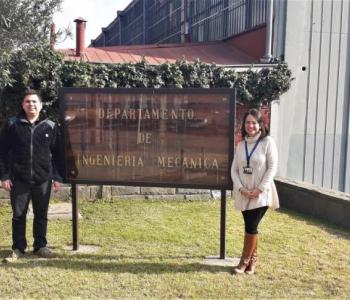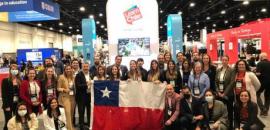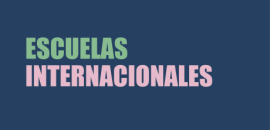Se encuentra usted aquí
Faculty and Engineering Departments Work Together towards the Academic Training of Global Engineers

August 26, 2019
The International Relations Unit of the Faculty of Engineering carried out the pilot version of the Global Engineers program, which had the participation of a French and an English student that worked collaboratively with the Department of Mechanical Engineering and Geographical Engineering.
With regard to the development of the first version, the General Secretary of the Faculty of Engineering, Ramón Blasco, points out "this is a great step within the training process of engineers of all specializations, because nowadays the engineering career is being indeed globalized. Our professionals work not only at local level, but also global, so the international experience is going to be very valuable in the future.”
Successful Cases
PhD Marcela Cruchaga is a full-time professor in the Department of Mechanical Engineering who works on teaching issues for both undergraduate and graduate programs. She was interested in taking part on this initiative due to personal and academic concerns. "If there's anything we can do, I'll always be interested in collaborating. I also have networks with other universities in France, and I really believe that the reception should be on both sides, from the home and host university, and, clearly, it should serve as means of communication.”
Cruchaga affirms that her experience in training global engineers was extremely positive. The coordination and joint work achieved a result that turned to be better than expected, "I think it was an exceptional experience, because we came up with a proposal and we asked ourselves what we could offer. It was very fluid; we had good coordination. The result was pretty good and, in that aspect, I am very pleased, very happy", the academic said.
On the other hand, the student selection for the program is another element to emphasize. For Cruchaga "the selection made surprised me; on this case, Zoé. We asked for a set of required skills depending on what they had to work on. Zoé came full of enthusiasm and with a good disposition to do the work and learn the new things.”
Jonathan Nuñez, PhD student in Engineering Sciences and teaching assistant of Professor Cruchaga, worked closely with Zoé in the laboratory and also has a positive opinion of her. "It was very nice to work with Zoé. She was willing to work with vibration and fluid mechanics topics, so she was quickly incorporated into experiments and simulation. The results were quite optimal and I believe that what we accomplished was thanks to her commitment to take the project forward. I was pleasantly surprised”, he states.
On the other hand, PhD René Garrido, Head of the Environmental Engineering degree program (Department of Geographical Engineering), reports that the work with James Ludlow, a student from Imperial College London, United Kingdom, focuses on the revaluation of organic waste as an alternative to energy recovery. "James is a student who lived in Chile before, so it was interesting that he wanted to come back. Then you realized that internationalization is not just about having a job abroad, it’s about the background of where you're going to stay as well", Garrido says.
At the same time, Garrido analyzes that when you start a project, you have to deal with some gaps that can only be found in Latin America. The academic training for professors represents an important step, since they not only need to speak English in order to teach in class, but also need to be trained in terms of teaching methodologies in different language. "James speaks Spanish, but I speak English, so we currently use English, unless he demands or wants to discuss certain things in Spanish. Learning curves are different in any language. In the case of a bilingual person, it is relevant how learning curves are completely different: understanding and emphasizing linguistic diversity is very important.”
In his opinion, the most remarkable aspect of this initiative is the new perspective that living abroad provides. This has made possible the understanding of learning within another context.
According to Cristian Díaz, Deputy Director of International Relations at the Faculty of Engineering, they are now expecting students from Germany, France and Brazil to come to the Department of Electrical Engineering and one student from Argentina to the Department of Civil Engineering.
Written by Catalina Aguila
Translated by Alexandra Cabrera



